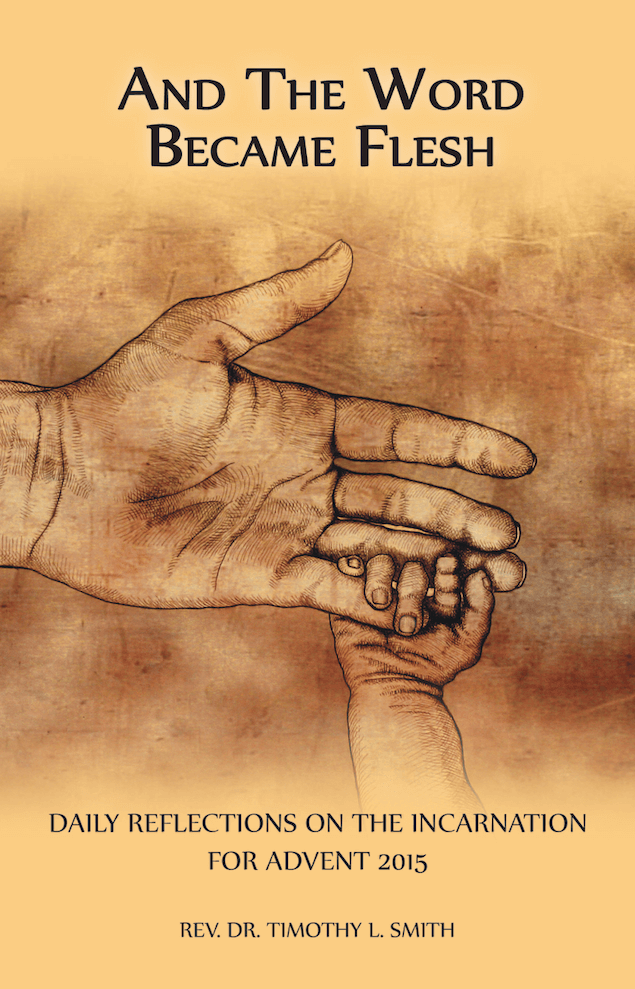The Twelfth Day of Advent
But when the fullness of time had come, God sent his Son, born of a woman, born under the law, in order to redeem those who were under the law, so that we might receive adoption as children. And because you are children, God has sent the Spirit of his Son into our hearts, crying, “Abba! Father!”
Galatians 4:4-6
They were the two cutest little guys, about four and five years old. The younger one excitedly blurts out to me, “One of us is adopted but I can’t remember which one!” Such is the grand, inclusive love of God the Father, Son, and Holy Spirit adopting us into the very life and love of the Triune circle. Eternal God though He was, Christ clothed Himself in our humanity to become our older brother (Romans 8:29). From the infinite heights of deity He humbled Himself in order to take on the finite limitations of our humanity.
Today’s Scripture proclaims the wonder we call the Incarnation: “God sent his Son, born of a woman”. Notice the juxtaposition of the words “sent” and “born”. His birth in Bethlehem is not the beginning of our Savior’s being. He comes forth as the eternal Son from the Father to be “born of a woman.” Here is His true humanity, for He must become truly human if He is to redeem. Scripture is always careful to say that Jesus was born of a woman, and not that He was born of man and woman. This fulfills the ancient prophecy of the Hebrew prophet Isaiah: “’Look, the virgin shall conceive and bear a son, and they shall name him ‘Emmanuel’, which means, ‘God is with us’” (Matthew 1:23, quoting Isaiah 7:14).
He is truly God with us “born under the law, in order to redeem those who were under the law.” He took on our humanity and perfectly fulfilled God’s law for us. It’s not just that the Son of God came to show what we ought to do, but He came to actually do for us what we could not do.“He offered to God a perfect confidence and trust, a perfect faith and response which we are unable to offer, and he appropriated all God’s blessings which we are unable to appropriate.” (Thomas Torrance, Theology in Reconstruction)
Jesus did all of this “so that we might receive adoption as children.” He came to enable us to share in the intimate, familial relationship with His Father. By becoming one with us, and fulfilling God’s holy law for us, Jesus empowers us to become the “adopted” children of God. What He is by His eternal essence, we can become by His grace. We can call Jesus’ Father our Father too! Jesus brings us into the same intimacy with Father God that He enjoys.
Yes, God sent His Son for us, but notice that He also “sent the Spirit of his Son into our hearts.” Here the Holy Spirit is called “the Spirit of his Son” because our sonship is based on Jesus’ sonship. He makes us participants in His very relationship with Father God. Jesus gives us all the rights of sonship, and the Spirit gives us the power to live them.
God sends His Holy Spirit into our “hearts”, into the very core of our being, prompting us to approach Father God with boldness, “crying, ‘Abba! Father!’” It is a cry of the heart!
“Abba” is the Aramaic diminutive for “father”, used affectionately in the intimacy of first century Jewish homes. “Abba” was the first, babbling sound a little child would make to his father. It expresses much the same warmth and intimacy as our “Daddy” or “Papa”. It was often on Jesus’ lips, and the sound was so sacred that it passed into the vocabulary of Greek-speaking Christians. Right now the Holy Spirit wants to move you to run to “Abba” and cry out to Him! Don’t whisper “Abba” as if hesitant and afraid! Cry out!
Brennan Manning writes in his book, Abba’s Child: the Cry of the Heart for Intimate Belonging, words that I like to carry with me: “My identity as Abba’s child is not an abstraction or a tap dance into religiosity. It is the core truth of my existence…Define yourself radically as one beloved by God. This is the true self. Every identity is an illusion.”
And why not! Because “when the fullness of time had come, God sent his Son, born of a woman.”
PONDERINGS
- What might being an “adopted” child of God mean for you?
- Brennan Manning, in Abba’s Child: the Cry of the Heart for Intimate Belonging, suggests taking a few moments to sit comfortably in a chair and repeat to God: “Abba, I belong to you….Abba, I belong to you.” Why not find a chair right now and repeat this in confident prayer to Abba!
EMBODIED PRAYER: KNEELING
“When the wise men found the baby Jesus, they knelt down and paid him homage” (Matthew 2:11). Many times throughout Scripture and the life of the church we find people kneeling to express their thoughts and feelings. English theologian David Peterson describes the impact of kneeling as we pray:
…an expression of inferior status and subservience to another person. Sometimes this obeisance was an indication of gratitude and sometimes it was associated with supplication or entreaty. Whatever the situation it was a recognition of total dependence of one party on another for the provision of some need…Sometimes it was associated with an outburst of praise, but sometimes the gesture itself appears to have been sufficient to express the trust and gratitude of those concerned. (David Peterson, Engaging with God: A Biblical Theology of Worship)
Sometimes people kneel to pray:
- Eyes open
- Looking up
- Hands lifted upward
Sometimes people kneel to pray:
- Looking downward with eyes averted or closed
- Hands folded
Today and every day of the Second Week of Advent pray the Lord’s Prayer while kneeling.




